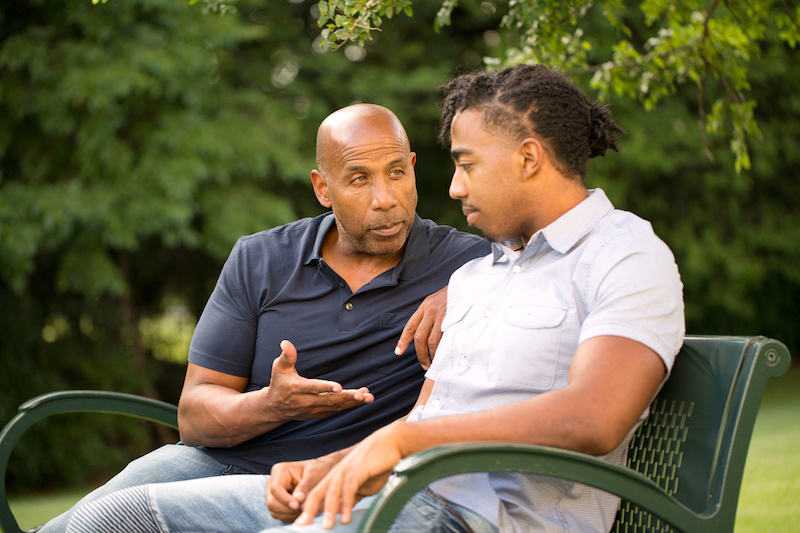Now that I see what my parents didn’t give me, how do I continue to interact with them?
Should I tell my parents how they failed me?
If I talk to my parents about CEN, won’t it make them feel bad?
How do I handle the pain that I feel now, as an adult, each time my parents treat me as if I don’t matter?
If you were raised by parents who were not tuned in enough to your emotional needs, you have probably experienced the results of this parental failure over and over throughout the years and into your adult life. Once you realize how deeply you have been affected by Childhood Emotional Neglect (CEN), it can become quite difficult to interact with the parents who neglected you.
One of the most frequent questions that I am asked by people who grew up with Childhood Emotional Neglect is, “Should I talk to my parents about CEN?”
It’s actually quite difficult to answer the questions above. Every single living human being had a childhood, and no two stories are the same. Indeed, the number of possible answers to the question is as infinite as the variety of different ways that CEN can happen. It can be extremely healing when an adult child and his or her parents are able to come to a mutual understanding of how an emotional failure happened and why, and how it affected everyone involved. This, however, can be a complicated business, difficult, and even risky.
It’s important to keep in mind that it is not at all necessary to include your parents in your recovery from CEN. As an adult, you can identify what you didn’t get, and you can give it to yourself. I have seen many people go through this process with great success without ever including their parents.
That said, you may certainly feel a wish or need to reach some understanding about CEN with your parents. If so, it is very understandable that you might feel this way. If you are wondering about whether to talk to them, one extremely important factor to consider is the type of CEN parents that you have.
The 3 Main Categories of CEN Parents
- Self-centered, Abusive, or Multiple-Failure Parents: These parents expect the child to fulfill their needs, rather than the other way around. They may not have treated you with the physical and emotional care and protection that a child needs from a parent.
- Struggling: These parents may mean well, but they are simply unaware of their child’s needs because they are struggling in their own lives. They may be struggling financially, emotionally, or with the caretaking of a sick family member or child, for example.
- WMBNT or Well-Meaning-But-Neglected-Themselves: These parents love their children and give them everything they can. But they are not able to give their child enough emotional responsiveness and validation because they didn’t receive it in their own childhoods. They may be simply “emotion blind.”
Parents who are in the last two categories, Struggling or WMBNT, stand a better chance of being able to get past their initial hurt, guilt, or defensiveness to have a fruitful talk with their adult children about CEN. If your parents were in the Self-centered category, were abusive, or failed you in many other ways as well, see the section below called Self-Centered, Abusive, or Multiple-Failure Parents.
First, let’s look at some general suggestions to consider. Then we’ll talk about how to apply them to the different types of parents.
5 Ways to Talk With Your CEN Parents
- Ask your parents about their own childhoods – If you are unsure about why your parents were blind to your emotional needs, ask them some questions about their own parents and their own childhoods. You may be able to see whether and how your parents were failed by their parents. If you can see your own parents more clearly, you may be able to understand why they failed you. Whether you decide to talk to them about CEN or not, your understanding of how they got their emotional blind spots may help you feel less hurt when you are affected by them.
- Try to find compassion for your parents – Often, when you can see how your own parents were emotionally neglected, you can feel some compassion for what they didn’t get. This can help you to feel less angry and frustrated with them for failing you.
- Anticipate and prepare – Think about whether to tell your parents about your discovery of CEN. Might one parent be more able to understand it than the other? Will your parents collapse into a pool of guilt for having failed you? Will they be completely unable to grasp it? Will they get angry?
- If possible, take a chance – If you feel there is a potential for positive results and healing, I suggest that you take a chance and talk about it.
- Talk with compassion and anticipate how your parents might feel – Many parents may feel accused, defensive, hurt, or guilty when you try to talk to them about CEN. It is very important to anticipate this and prevent it. Here are some guidelines:
- Choose your moment wisely, with few distractions, when your parents are in a calm mood. Decide whether to talk with one parent first or both together.
- If at all possible, have this conversation in person. It can be difficult to see what your parents are feeling or to respond to them in a helpful way via phone or electronic communication.
- Tell them that this is a new discovery about yourself that you wish to share with them.
- Talk about CEN with compassion for them and how they were raised.
- Talk about how invisible and insidious it is, and how easy it is for loving, well-meaning parents to pass it down to their children.
- Tell them what you are doing to heal yourself.
- Be clear that this is not a matter of blame and not an accusation; you are talking with them about it only because you want to move forward and be closer to them.
- Offer to give them a copy of Running on Empty: Overcome Your Childhood Emotional Neglect so that they can read about it for themselves.
Self-Centered, Abusive, or Multiple Failure Parents
If you have parents who fall into one of these categories, then you are faced with a situation that is even more complex than those above. Unless your parents have changed and grown since your childhood, I am sorry to say that most likely they will not be able to grasp the CEN concept or to respond to you in any positive way.
For you, I offer one guiding principle that may be difficult for you to accept. But I stand by it, after having treated scores of CEN people with parents like this. Here it is:
Make the decision about whether to talk to your parents about CEN based solely upon your own needs. If you think it may strengthen you or make you feel better to talk with them (even if it causes a rupture or distance between you), then do it. If not, then do not. You are not obligated to take your parent’s needs and preferences into account. On this, it’s all about you.
In other words, if you had an abusive or multiple-failure parent, you have carte blanche permission to do whatever you feel will benefit you in your life. You, your children, and your spouse come first. You do not need to protect your parents from the knowledge that they failed you.
Parents who were abusive to you as a child, either verbally, emotionally, physically, or sexually, are also, by definition, emotionally neglectful. If they had been emotionally attuned to you enough, they would not have been able to treat you this way.
If your parents were/are abusive in any way, then it may be of more value to talk with them about the abuse than about the neglect since abuse is far more visible and tangible than CEN. Because CEN can be so imperceptible and hides beneath abuse, it will be very difficult and unlikely for abusive parents to ever grasp the concept.
Unless your parents have been to therapy, have confronted their own issues and abusive ways, and actively changed, (for example, an alcoholic or addicted parent who gets sober and goes to AA such that his/her personality becomes truly different) they will probably be no more able to hear you now than they could when you were a child.
So, ask yourself, “If I talk with my parents about CEN, what are the possible outcomes?” Will they tell you that you are too sensitive and that you are blowing things out of proportion? Will they blow up in anger? Will they likely say something abusive? Will they twist around what you are saying, and use it against you somehow?
If any of these are likely, I suggest that you put your energy toward healing yourself, and leave your parents out of it. It is extremely important if you do decide to talk with them, that you do it with the understanding that you may need to protect yourself emotionally. It is vital that you be strong enough to not be emotionally damaged by their words or reactions. This is a tall order for anyone but is especially so when you were raised by self-centered or abusive parents.
The Takeaway
It is certainly not necessary to talk to your parents about CEN. You can heal from it without ever doing so. Learning more about your parents’ childhoods and having compassion for them may help make their emotionally neglectful ways less painful to you now. However, sharing the concept of CEN with them can be helpful in some families, and may be a way for you to improve your relationship with them. Be sure to take into account the type of CEN parents that you have when making the decision to talk with them. Your path to healing is unique to you. There are no right or wrong answers.
To learn much more about CEN and how it affects various areas of your life, watch my free Breakthrough Video Series.
For much more information, details, and support for talking with your parents see the book Running On Empty No More: Transform Your Relationships With Your Partner, Your Parents & Your Children.
To find out whether you grew up with CEN Take the Emotional Neglect Test. It’s free.
Above all else, remember that your feelings are important and your needs are important. Yes, you matter.












